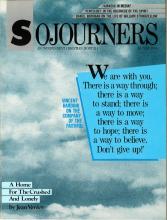It has been difficult and sometimes impossible to discuss in a casual fashion my three-and-a-half-week journey to the Soviet Union. It was a compact and concentrated time—the intensity left me reeling. I find I am still sifting through and sorting out memories of my Soviet experiences to understand their meaning and deal with my emotional response. Many months have passed, and I still feel like I ate a large, rich meal that hasn't digested.
Two themes do emerge from the journey: it was an experience of paradox and surprise. Before leaving, I considered myself a sophisticated traveler, informed, prepared, and highly educated about the Soviet Union. I regarded the trip as a fact-finding mission; after years of working on issues of peace and disarmament, I was finally traveling to the Soviet Union.
I intended to probe the hard issues and to press for answers to the questions so often put before me. I packed three large empty notebooks and a ridiculous assortment of pens. I regarded the trip as a journey that would be predominantly an intellectual experience, rather like the way I visit museums—studying each scene with care and then moving on.
The trip was not at all what I expected. Yes, I discussed sensitive issues and asked hard questions. But far more than an intellectual experience, it was a journey of the heart. I did not fill the three notebooks I had so carefully packed, but, almost daily, I played my guitar and sang with newly-made Soviet friends. (My guitar—that cumbersome addition I decided at the last moment to take along!)
Read the Full Article

